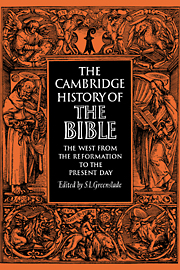Book contents
- Frontmatter
- Chapter I The Bible in the Reformation
- Chapter II Biblical Scholarship: Editions and Commentaries
- Chapter III Continental Versions to c. 1600
- Chapter IV English Versions of the Bible, 1525–1611
- Chapter V The Religion of Protestants
- Chapter VI The Bible in the Roman Catholic Church from Trent to the Present Day
- Chapter VII The Criticism and Theological Use of the Bible, 1700–1950
- Chapter VIII The Rise of Modern Biblical Scholarship and Recent Discussion of the Authority of the Bible
- Chapter IX Continental Versions from c. 1600 to the Present Day
- Chapter X English Versions since 1611
- Chapter XI The Bible and the Missionary
- Chapter XII The Printed Bible
- Chapter XIII Epilogue
- Appendices
- Bibliography
- Notes on the Plates
- Index
- Plate Section
- References
Chapter VII - The Criticism and Theological Use of the Bible, 1700–1950
Published online by Cambridge University Press: 28 March 2008
- Frontmatter
- Chapter I The Bible in the Reformation
- Chapter II Biblical Scholarship: Editions and Commentaries
- Chapter III Continental Versions to c. 1600
- Chapter IV English Versions of the Bible, 1525–1611
- Chapter V The Religion of Protestants
- Chapter VI The Bible in the Roman Catholic Church from Trent to the Present Day
- Chapter VII The Criticism and Theological Use of the Bible, 1700–1950
- Chapter VIII The Rise of Modern Biblical Scholarship and Recent Discussion of the Authority of the Bible
- Chapter IX Continental Versions from c. 1600 to the Present Day
- Chapter X English Versions since 1611
- Chapter XI The Bible and the Missionary
- Chapter XII The Printed Bible
- Chapter XIII Epilogue
- Appendices
- Bibliography
- Notes on the Plates
- Index
- Plate Section
- References
Summary
Criticism of the Traditional Use by Rationalists
It is not unjust to trace the origins of biblical criticism in the modern sense back to the Renaissance. The liberation of men's minds from the dead weight of authority and tradition made it inevitable that, sooner or later, the Bible would cease to be treated, as it had been throughout the Middle Ages, as a supernaturally guaranteed revelation beyond the scope of rational inquiry. The Reformation, in the sense that it was a by-product of the Renaissance, assisted rather than hindered the process, for in their critical approach to the Bible, as in other matters, Luther and Calvin ranged themselves on the side of those who upheld the right of private judgment against an externally imposed authority. ‘The Protestant writers against Rome were forging the weapons which were soon to be used against themselves.’
The attempt of their successors to invest the Bible with the authority that the Church had lost was therefore bound to be little more than an ineffective effort to turn back the clock. A new spirit had come into western life and thought which was prepared to challenge every assumption and question every assertion. Men were no longer prepared to limit their inquiries to the narrow confines prescribed by traditional orthodoxy and ecclesiastical protocol. Whether they accepted Reason or the Spirit as their guide they acknowledged as their ultimate criterion nothing but the establishment of the truth.
- Type
- Chapter
- Information
- The Cambridge History of the Bible , pp. 238 - 293Publisher: Cambridge University PressPrint publication year: 1963
References
- 6
- Cited by

